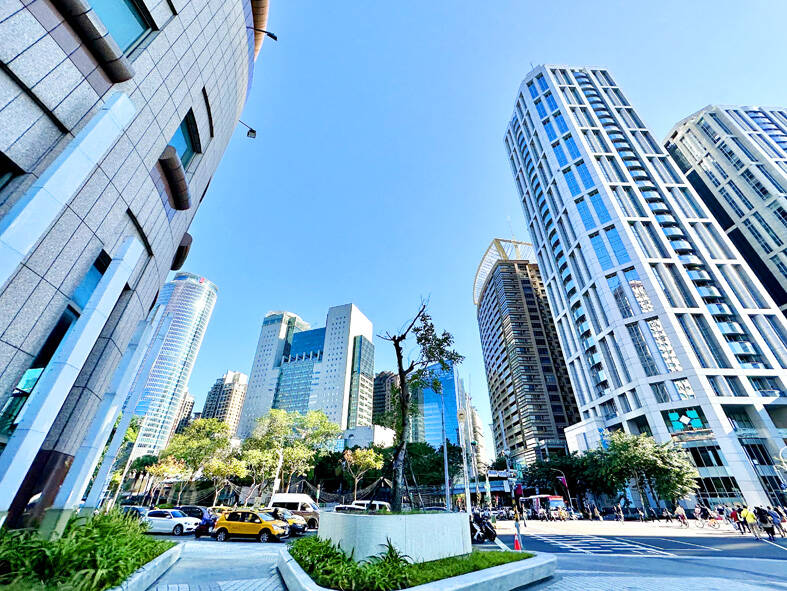Housing transactions in the six special municipalities last month totaled 23,801 units, representing a 16.9 percent increase from a year earlier, as favorable lending terms and stock market rallies bolstered buying interest, data released by separate local administrations showed on Monday.
Real demand for first homes continued to facilitate transactions after the government in August last year introduced an interest rate subsidy to help people buy their own home, Sinyi Realty Inc (信義房屋) research manager Tseng Ching-der (曾敬德) said in a note.
Buying interest remained strong even though the central bank last month tightened the loan-to-value limit from 70 percent to 60 percent for second-home purchases in Taipei, New Taipei City, Taoyuan, Taichung, Tainan and Kaohsiung, as well as Hsinchu city and county, Tseng said.

Photo: Hsu Yi-ping, Taipei Times
The measure, which reflected the central bank’s concern over the increases in housing loans and prices, does not affect first-home purchases, which still qualify for low interest rates of 1.775 percent, a five-year grace period and mortgages of up to 40 years until the stimulus program expires in 2026, Tseng said.
That helped explain why the market remained stable last month, while the number of homes available for sale declined, he said, expecting the uptrend to continue into the second half as long as the local bourse remained strong.
The stock market rallies inflate wealth for investors and expedite home purchase decisions, Tseng added.
Tainan reported the biggest increase of 44 percent in transactions from a year earlier to 2,399 units, followed by a 37.8 percent advance in Taoyuan to 4,641 units, and Kaohsiung’s 30.5 percent rise to 4,048 units, the data showed.
Taichung posted a 5.5 percent pickup to 2,619 units, while Taipei and New Taipei City posted moderate increases of 5.4 percent and 1.9 percent to 2,619 units and 5,369 units respectively.
Last month’s total transactions represented an 11.5 percent decrease when compared with one month earlier, due mainly to a lack of new home deliveries, rather than a turnaround in sentiment, Evertrust Rehouse Co (永慶房屋) deputy research head Chen Chin-ping (陳金萍) said.
Taiwan’s robust economic data helped underpin the TAIEX rallies and housing transactions, Chen said, adding that the uptrend is expected to continue.
However, Great Home Realty Co (大家房屋) expressed doubt that the momentum could be sustained, as the government has moved to tighten reviews of first-home loan applications to root out dummy buyers and loan abuses.
Property investors use the favorable lending terms to buy houses through dummy accounts to generate rent income, in violation of the self-occupancy requirement.
The government might adopt more restrictions if the property fever grows unchecked, Great Home said.
Overall, housing deals in the six special municipalities totaled 136,499 units in the first half of this year, up 27.6 percent from the a year earlier, the data showed.

CHIP RACE: Three years of overbroad export controls drove foreign competitors to pursue their own AI chips, and ‘cost US taxpayers billions of dollars,’ Nvidia said China has figured out the US strategy for allowing it to buy Nvidia Corp’s H200s and is rejecting the artificial intelligence (AI) chip in favor of domestically developed semiconductors, White House AI adviser David Sacks said, citing news reports. US President Donald Trump on Monday said that he would allow shipments of Nvidia’s H200 chips to China, part of an administration effort backed by Sacks to challenge Chinese tech champions such as Huawei Technologies Co (華為) by bringing US competition to their home market. On Friday, Sacks signaled that he was uncertain about whether that approach would work. “They’re rejecting our chips,” Sacks

Taiwan’s exports soared 56 percent year-on-year to an all-time high of US$64.05 billion last month, propelled by surging global demand for artificial intelligence (AI), high-performance computing and cloud service infrastructure, the Ministry of Finance said yesterday. Department of Statistics Director-General Beatrice Tsai (蔡美娜) called the figure an unexpected upside surprise, citing a wave of technology orders from overseas customers alongside the usual year-end shopping season for technology products. Growth is likely to remain strong this month, she said, projecting a 40 percent to 45 percent expansion on an annual basis. The outperformance could prompt the Directorate-General of Budget, Accounting and

NATIONAL SECURITY: Intel’s testing of ACM tools despite US government control ‘highlights egregious gaps in US technology protection policies,’ a former official said Chipmaker Intel Corp has tested chipmaking tools this year from a toolmaker with deep roots in China and two overseas units that were targeted by US sanctions, according to two sources with direct knowledge of the matter. Intel, which fended off calls for its CEO’s resignation from US President Donald Trump in August over his alleged ties to China, got the tools from ACM Research Inc, a Fremont, California-based producer of chipmaking equipment. Two of ACM’s units, based in Shanghai and South Korea, were among a number of firms barred last year from receiving US technology over claims they have

BARRIERS: Gudeng’s chairman said it was unlikely that the US could replicate Taiwan’s science parks in Arizona, given its strict immigration policies and cultural differences Gudeng Precision Industrial Co (家登), which supplies wafer pods to the world’s major semiconductor firms, yesterday said it is in no rush to set up production in the US due to high costs. The company supplies its customers through a warehouse in Arizona jointly operated by TSS Holdings Ltd (德鑫控股), a joint holding of Gudeng and 17 Taiwanese firms in the semiconductor supply chain, including specialty plastic compounds producer Nytex Composites Co (耐特) and automated material handling system supplier Symtek Automation Asia Co (迅得). While the company has long been exploring the feasibility of setting up production in the US to address